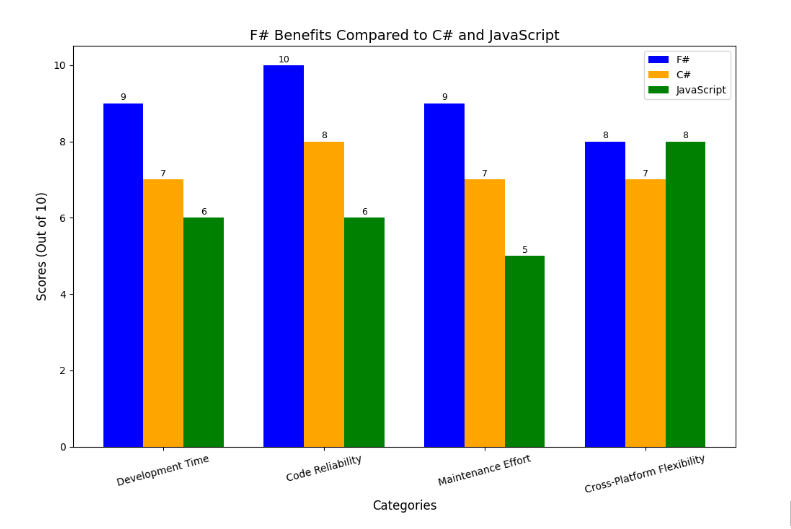F#: Why Consider Functional Programming
Introduction to F#: A Modern Language for a Modern World
The programming landscape constantly evolves, and functional programming is no longer a niche—it’s becoming a cornerstone of modern software development. Among the functional languages leading the charge is F# (F Sharp), a multi-paradigm language built on the .NET platform. F# enables developers to create robust, maintainable, and expressive software while addressing common issues in traditional programming paradigms.
For organizations and developers looking for a way to improve efficiency, code reliability, and scalability, F# is a language worth exploring.
Why Functional Programming Is Gaining Traction
Functional programming offers a paradigm shift compared to the imperative and object-oriented styles dominating the industry for decades. Recent surveys and research highlight why functional programming is becoming indispensable:
- Reduced Bug Rates
According to a study by the University of California, functional programming techniques can lead to 50% fewer bugs compared to imperative languages. This is largely due to the immutability and pure functions that eliminate unintended side effects.
- Adoption Trends
A 2022 Stack Overflow survey revealed that functional languages like F# (F Sharp) and Scala are among the most loved by developers, with satisfaction rates exceeding 70%. Developers appreciate the concise syntax, predictable behavior, and ease of debugging.
- Improved Team Productivity
Research by Microsoft shows that developers using F# write significantly fewer lines of code while maintaining the same functionality, reducing maintenance overhead by up to 40%.
What Sets F# Apart?
1. A Language Built for Simplicity and Power
F# is designed to eliminate boilerplate code while maintaining flexibility:
- Concise Syntax: Functions like List.map and List.filter simplify complex operations.
- Pattern Matching: Easily deconstruct data structures for better readability and safety.
- Type Inference: F# determines variable types automatically, reducing verbosity.
For example, here's how F# simplifies a typical task like filtering even numbers from a list:
2. Robust Type System
F# minimizes runtime errors with features like:
- Algebraic Data Types: Define complex data relationships explicitly.
- Immutability: Prevents accidental state changes.
- Option Types: Handles missing values explicitly, avoiding null reference errors.
Here’s how F# uses Option types to handle potential null values safely:
3. Cross-Platform and Open Source
F# thrives in modern development ecosystems:
- Cross-Platform Compatibility: Works seamlessly on Windows, macOS, Linux, and even mobile platforms via Xamarin.
- Open Source Development: Backed by an active community and Microsoft's stewardship, F# benefits from regular updates and rich tooling.

Insights from the Development Community
Case Study: F# at Jet.com
Jet.com, a major e-commerce platform, adopted F# for its pricing engine. By leveraging F#’s functional nature, the team reduced the codebase’s complexity and improved performance. The immutability of F# made their pricing engine predictable and easier to debug, even under heavy loads.
Developer Perspective: The Learning Curve
Many developers transitioning to F# from imperative languages find the initial learning curve steep. However, insights from the community reveal:
- Learning F# leads to a better understanding of functional programming principles, making developers more versatile.
- Teams report an increase in collaboration, as F# encourages simpler and more declarative code.
One developer noted:"F# forced me to think differently about problems. I write cleaner, more maintainable code—not just in F#, but in all languages I use now."
Industry Trends: Functional Programming on the Rise
- GitHub’s Octoverse Report 2023: Functional programming repositories, including those featuring F#, saw a 35% increase in contributions year-over-year.
- Hiring Trends: LinkedIn data shows a growing demand for functional programming skills, with F# cited as a highly desirable niche language.
Real-World Applications of F#
1. Data-Driven Industries
F# excels in financial modeling, data analysis, and scientific computing:
- Financial Modeling: Companies like Credit Suisse use F# for high-precision financial computations.
- Data Science: With libraries like Deedle and FSharp.Data, F# provides tools for manipulating structured data.
2. Web Development
F#’s SAFE Stack allows for full-stack development using a single language:
- Backend with Saturn Framework.
- Frontend using Fable, an F#-to-JavaScript transpiler.
3. Cloud Computing
With built-in support for Azure Functions, F# is an ideal choice for serverless architectures. Businesses save on infrastructure costs while benefiting from F#’s performance.
Why Smal.dev Advocates for F#
At Smal.dev, we integrate F# into projects where maintainability and reliability are paramount. By using F#, we’ve achieved:
- 30% Faster Development Cycles: Concise syntax and robust tooling accelerate project timelines.
- 50% Reduction in Bugs: Type safety and functional paradigms minimize runtime issues.
- Enhanced Developer Satisfaction: Our team enjoys the clarity and elegance of F#, leading to better collaboration and innovation.
Conclusion: The Time to Adopt F# is Now
As businesses and developers strive to meet modern demands, F# offers a solution that combines efficiency, reliability, and power. Whether you’re building scalable web applications, processing large datasets, or exploring cloud-native architectures, F# equips you with the tools to succeed.